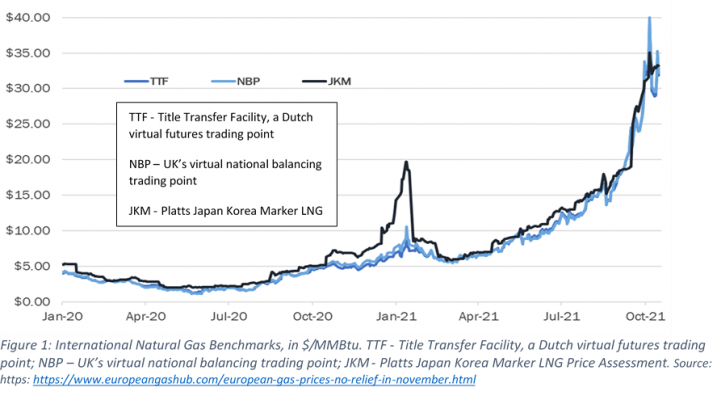The webinar, organized by the UNECE Group of Experts on Gas, explores the recent dramatic swings in natural gas prices and their impact on the United Nations development agenda -- climate action, energy transitions, and social cohesion.
The event will discuss three key questions:
-
Gas and energy prices: where we are at?
-
Can volatile energy prices kill the UN development agenda?
-
Prolonged COVID + high gas prices = deep crisis? What will 2022 bring
Join the Webinar
Join the Webinar via Webex link: https://unece.webex.com/unece/onstage/g.php?MTID=ee7ced7cccb1b5e15ac90543ae4e204e1
Gas markets overview
Aside from the public health crisis, the COVID-19 pandemic had caused unprecedented drops in the energy prices. On 20 April 2020, for example, the oil prices dipped for a few hours into the negative territory and settled at minus $37.63 a barrel on the New York Mercantile Exchange. Natural gas prices mirrored the oil markets. Then the pendulum swung the other way: in the next 18 months, between April 2020 and October 2021, the energy prices increased more than seven times: on 6 October 2021, the November futures exceeded $2,000 per 1,000 cubic meters at Dutch TTF.
Impact of gas prices on UN development agenda
High energy and gas prices have, to put it mildly, lowered the likelihood of achieving the UN 2030 development agenda as reflected in the Sustainable Development Goals. Particularly negatively affected are goals on poverty, hunger, health, air quality, and gender.
Gas prices are particularly important to climate action, since most gas experts agree that natural gas is, and will be, the key component of an increasingly decarbonised energy system in 2050 and beyond. However, natural gas, let alone its prices, were not much discussed at the 2021 United Nations Climate Change Conference (COP26). The discussion referred to the IPCC special report on 1.5C and the International Energy Agency’s net-zero emissions pathway. Both call for rapid cuts in, first of all, coal, and then in oil and gas, if the world is to stay below 1.5C.
COP26 witnessed the launch of the “beyond oil and gas alliance” (BOGA) that advocates “a managed and just transition away from oil and gas production”. BOGA’s key members are Denmark, Costa Rica, France, Greenland, Ireland, Quebec, Sweden, Wales, California, New Zealand and Portugal. Prominently absent were the Unite States, the United Kingdom, Russia, Saudi Arabia, China and India. The BOGA members account for less than 1 per cent of global oil and gas oil production.
High gas and energy prices have had another effect on climate action: the priorities of many well-intended people in the developed world have slid down the pyramid of the Maslow's hierarchy of needs, towards keeping a status quo that warm homes and food on the table bring. Such a mindset will certainly put decarbonisation on a backburner and take the steam out of wider climate action, including the role of gas in it.
UNECE gas experts believe that natural gas, when managed sustainably, can improve affordability, availability, and accessibility of energy, and thus alleviate many economic and social plagues of both developing and developed countries.


